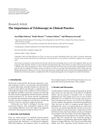3 citations,
January 2021 in “Journal of dermatology & cosmetology” Current alopecia treatments manage symptoms but don't cure, and better treatments are needed.
 8 citations,
May 2020 in “Anais Brasileiros de Dermatologia”
8 citations,
May 2020 in “Anais Brasileiros de Dermatologia” Higher levels of ischemia-modified albumin in telogen effluvium patients may indicate oxidative stress.
 43 citations,
November 2007 in “Dermatologic Clinics”
43 citations,
November 2007 in “Dermatologic Clinics” Hair and nail changes can indicate health issues, including cancer and side effects from cancer treatments.
 11 citations,
September 2013 in “Journal of The European Academy of Dermatology and Venereology”
11 citations,
September 2013 in “Journal of The European Academy of Dermatology and Venereology” People with alopecia areata may be more likely to have a certain type of hearing loss.
 7 citations,
January 2013 in “Dermatology Research and Practice”
7 citations,
January 2013 in “Dermatology Research and Practice” Trichoscopy is a valuable tool for diagnosing and managing hair and scalp disorders.
 54 citations,
March 1987 in “Journal of The American Academy of Dermatology”
54 citations,
March 1987 in “Journal of The American Academy of Dermatology” 3% topical minoxidil effectively treats extensive alopecia areata with few side effects.
2 citations,
December 2023 in “Pharmaceutics” Inhaling medicine may reduce side effects and improve treatment for a major lung cancer type.
34 citations,
January 2020 in “Expert opinion on drug delivery” New methods like microneedling and nanoparticles can improve hair loss treatments.
January 2014 in “Astrocyte” Some drugs may cause hair loss in women.
 15 citations,
February 2018 in “Journal of Cosmetic and Laser Therapy”
15 citations,
February 2018 in “Journal of Cosmetic and Laser Therapy” Laser-assisted drug delivery improves hair loss.
 8 citations,
April 2020 in “Journal of The American Academy of Dermatology”
8 citations,
April 2020 in “Journal of The American Academy of Dermatology” Bicalutamide may be a promising alternative treatment for female pattern hair loss.
 4 citations,
March 1989 in “The BMJ”
4 citations,
March 1989 in “The BMJ” Naproxen is not the cause of hair loss in a child; it's due to a toxic event with expected hair regrowth.
 4 citations,
August 2021 in “GSC biological and pharmaceutical sciences”
4 citations,
August 2021 in “GSC biological and pharmaceutical sciences” Some plants might help prevent or treat hair loss.
 4 citations,
May 2019 in “Skin Research and Technology”
4 citations,
May 2019 in “Skin Research and Technology” Finasteride helps hair growth but stopping it causes faster hair loss.
 147 citations,
April 1994 in “Drug Safety”
147 citations,
April 1994 in “Drug Safety” Some drugs can cause hair loss or increase hair growth, but these effects are usually reversible when the drug is stopped.
9 citations,
November 2021 in “PubMed” FDA-approved low-level light/laser therapy devices can significantly increase hair density in people with pattern hair loss.
 3 citations,
April 2021 in “Biomolecules & Therapeutics”
3 citations,
April 2021 in “Biomolecules & Therapeutics” The protein ER71/ETV2 helps regrow hair after chemotherapy by improving the growth of new blood vessels.
 3 citations,
January 2021 in “Plastic and Aesthetic Research”
3 citations,
January 2021 in “Plastic and Aesthetic Research” Hair loss reduces hair thickness and coverage, but drug treatments mainly revive dormant hairs rather than reverse thinning; patients often undervalue their hair loss severity.
 1 citations,
March 2018 in “Dermatologie pro praxi”
1 citations,
March 2018 in “Dermatologie pro praxi” Most over-the-counter hair loss treatments lack strong evidence of effectiveness, except for minoxidil, which works but stops working if you stop using it.
 January 2023 in “Skin appendage disorders”
January 2023 in “Skin appendage disorders” Scalp microinfusion is a new method for treating hair loss that shows promise but needs more research for standardization.
 4 citations,
December 2020 in “International journal of research - granthaalayah”
4 citations,
December 2020 in “International journal of research - granthaalayah” Tetracycline can stick to hair follicles and potentially cause hair loss.
 7 citations,
January 2014 in “Rinshō shinkeigaku”
7 citations,
January 2014 in “Rinshō shinkeigaku” Finasteride, a hair loss medication, may be linked to stroke in young men.
 September 2023 in “The Journal of Steroid Biochemistry and Molecular Biology”
September 2023 in “The Journal of Steroid Biochemistry and Molecular Biology” Stopping finasteride for male pattern hair loss changes neuroactive steroid levels in the brain and blood.
 2 citations,
January 2014 in “Journal of clinical and investigative dermatology”
2 citations,
January 2014 in “Journal of clinical and investigative dermatology” Some drugs used to treat immune conditions may cause different types of hair loss.
2 citations,
January 2018 in “Indian Journal of Psychiatry/Indian journal of psychiatry” Methylphenidate can cause hair loss, which stops when the drug is discontinued.
 15 citations,
February 2019 in “Journal of clinical medicine”
15 citations,
February 2019 in “Journal of clinical medicine” Atorvastatin reversed memory problems caused by cancer drug trastuzumab and improved its cancer-fighting abilities without causing hair loss.
9 citations,
October 2012 in “Klinik Psikofarmakoloji Bülteni-Bulletin of Clinical Psychopharmacology” Stopping the drug olanzapine can reverse hair loss caused by it.
 1 citations,
August 2004 in “Alternative & complementary therapies”
1 citations,
August 2004 in “Alternative & complementary therapies” Non-drug methods like diet, supplements, and aromatherapy can help manage hair loss and its emotional impact.
 July 2018 in “Elsevier eBooks”
July 2018 in “Elsevier eBooks” Some drugs can cause reversible hair loss, but certain chemotherapy drugs may lead to permanent hair loss; drugs can also change hair color and texture.
April 2018 in “Journal of Investigative Dermatology” Screening for the NUDT15 gene variant can prevent severe side effects from thiopurine drugs in East-Asian people.





















